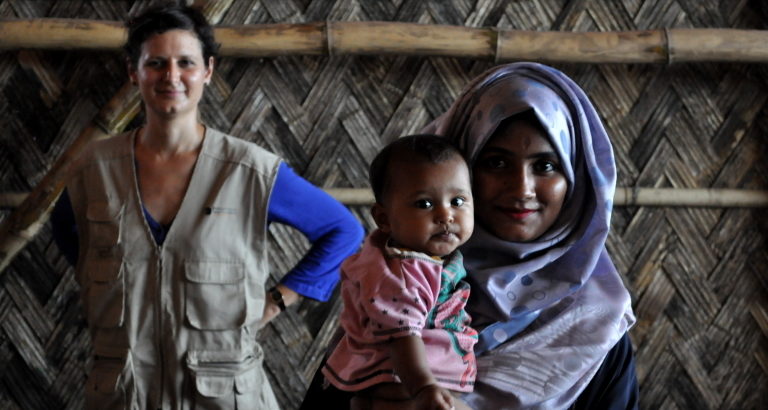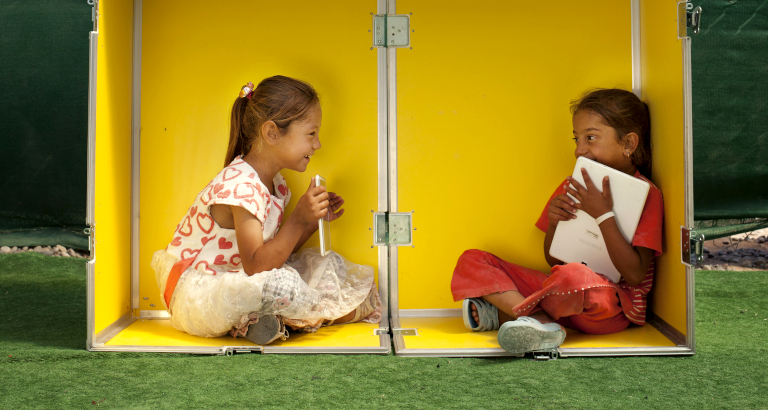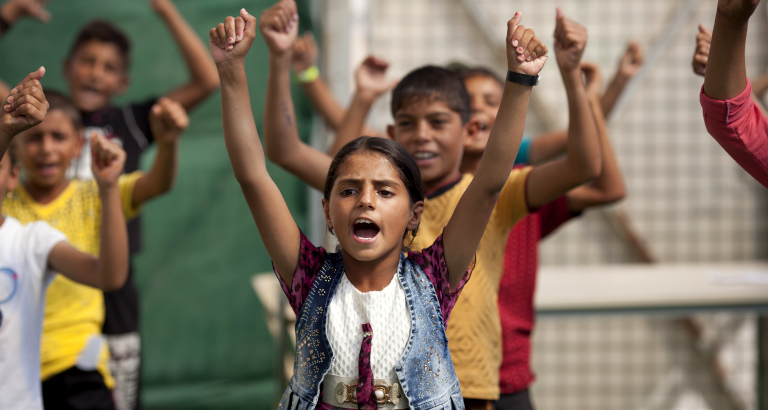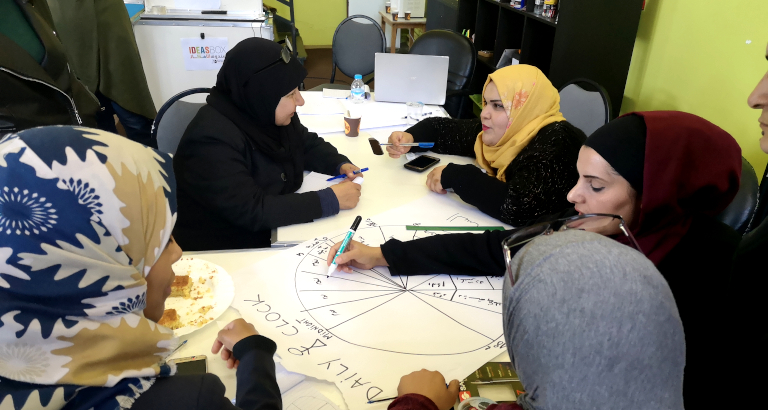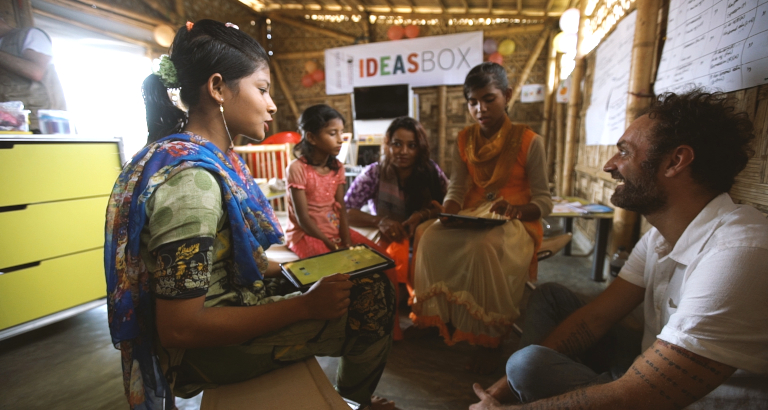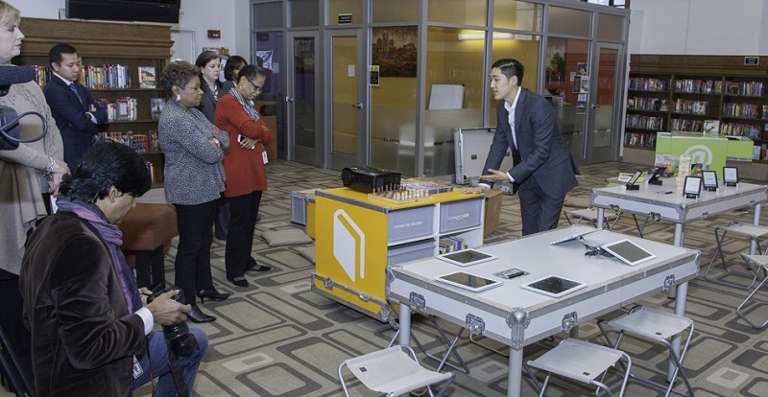After noting a lower attendance and uneven use of Ideas Boxes by girls and women, Libraries Without Borders joined forces with the Chanel Foundation in 2018 to counter this trend by creating the Ideas Box 4 Women program. Our goal: to strengthen their capacity to act so that they can express themselves and emancipate themselves freely, everywhere in the world.
We look back on this program with Muy-Cheng Peich, Director of Education of the association, and Marie Aquili, in charge of training and mediation for the project.
In 2018, Ideas Box 4 Women is the result of a general observation made across all our actions, in France and internationally, in all contexts: girls and women represent only 37% of Ideas Box users, compared to 63% of boys and men. Even though these spaces can be great opportunities for women and girls to learn, read and socialise, why are they under-represented in our projects?
One of the main causes, not surprisingly, is patriarchy and gender stereotypes. In many countries still, women have to stay at home, be discreet, are naturally assigned to domestic and daily tasks related to the well-being of the family. In some contexts, our partners also report that women are very often the first victims of violence in the community, whether psychological or physical.
So how can we make our projects more equal? Based on the diagnosis established in different areas of intervention, kits for the leaders of our projects have been created around several themes, with the help of many local partners: maternal and child health, financial autonomy and women’s entrepreneurship, leadership and influence strategy, and the fight against gender-based violence. They include specific content for face-to-face and online training as well as activity sheets to support them as well as possible and make the Ideas Box a safe and attractive space for girls and women.
At the beginning of 2020, training was also organised for our partners in the field, project managers and mediators, in Burundi and Jordan. These training sessions were an opportunity to also raise awareness among boys and men about gender inequalities and the challenges involved in combating them.
“We can’t come into a community and forcibly impose on them our conception of gender. Our goal is to make the animators themselves aware of the local unequal situation. We then give them the keys to address these issues, while respecting the culture and customs of the community. Awareness has to be raised locally.” says Muy Cheng Peich, BSF’s Director of Education.
During the trainings, many exercises are participatory. Among them, a daily clock of routines has to be filled in by women and men. The result is striking.
“When the facilitators are asked to draw a typical day for a woman versus a typical day for a man and then compare the clocks, it is clear that women have a much higher family and household burden than men. They don’t have a second to themselves, unlike men who have much more time for leisure. Basically, everyone knows this, but seeing it in practice has a much greater impact.” Muy-Cheng points out.
In Burundi, in the Buterere neighbourhood of Buterere, working on local myths and songs also highlights how stereotypes accompany everyone from an early age. In our Ideas Boxes, for example, it is not uncommon for some boys to impose themselves and make girls understand that games are not for them.
“Human relationships can be very hard. Sometimes it’s the law of the strongest that prevails: if three boys and two girls want to use the tablet, it’s going to be decided by the strength of the wrist. This is why our interest is to create a community of good practices based on the different kits created by our teams, which can be improved according to the feedback and first experiments of our partners.” says Marie Aquili, in charge of training and mediation for the programme.
To overcome the barriers of access to the Ideas Box, concrete strategies have been put in place: reserving time slots only for girls and women, organizing mixed activities and encouraging boys to invite girls to play with them. It is also important to ensure that there are always female facilitators and referrers.
“We invite women to visit the Ideas Box when they come to drop off their children, for example after meals, when they are more available. The girls love the cinema module where empowerment films are regularly shown. But we remain vigilant: cinema may be exciting but it is also the most passive. It makes you dream and gives you energy, but you want to take concrete action.” says Marie.
Although the Ideas Box 4 Women programme has been well received by the communities, Muy-Cheng and Marie nonetheless stress the importance of comprehensive and sustainable awareness.
“By unconsciously conveying the idea of women being locked into a role, men here recognize that they are responsible for this form of machismo in their daily lives. If we let go now, the awareness process will stagnate. We are on the right track, but there is still a lot to be done. Once we leave, it’s up to the project managers in the field to take over, to observe the evolution of interactions, behavioural change and blockages. The numbers speak for themselves: the inclusion of women and girls must become one of our priorities, everywhere in the world. They are still half of humanity, which is why it is absolutely necessary to act.” concludes Marie.
Many thanks to the partners of this program: the Chanel Foundation, the associations Giriyuja, Jesuit Refugee Service and International Rescue Committee.
Since 2007, Libraries Without Borders has been working tirelessly to bring knowledge to those who are deprived of it – from refugee camps in Bangladesh to rural areas in France – and to make the right to culture a fundamental human right. In thirteen years, the association has reached more than six million people in fifty countries.
